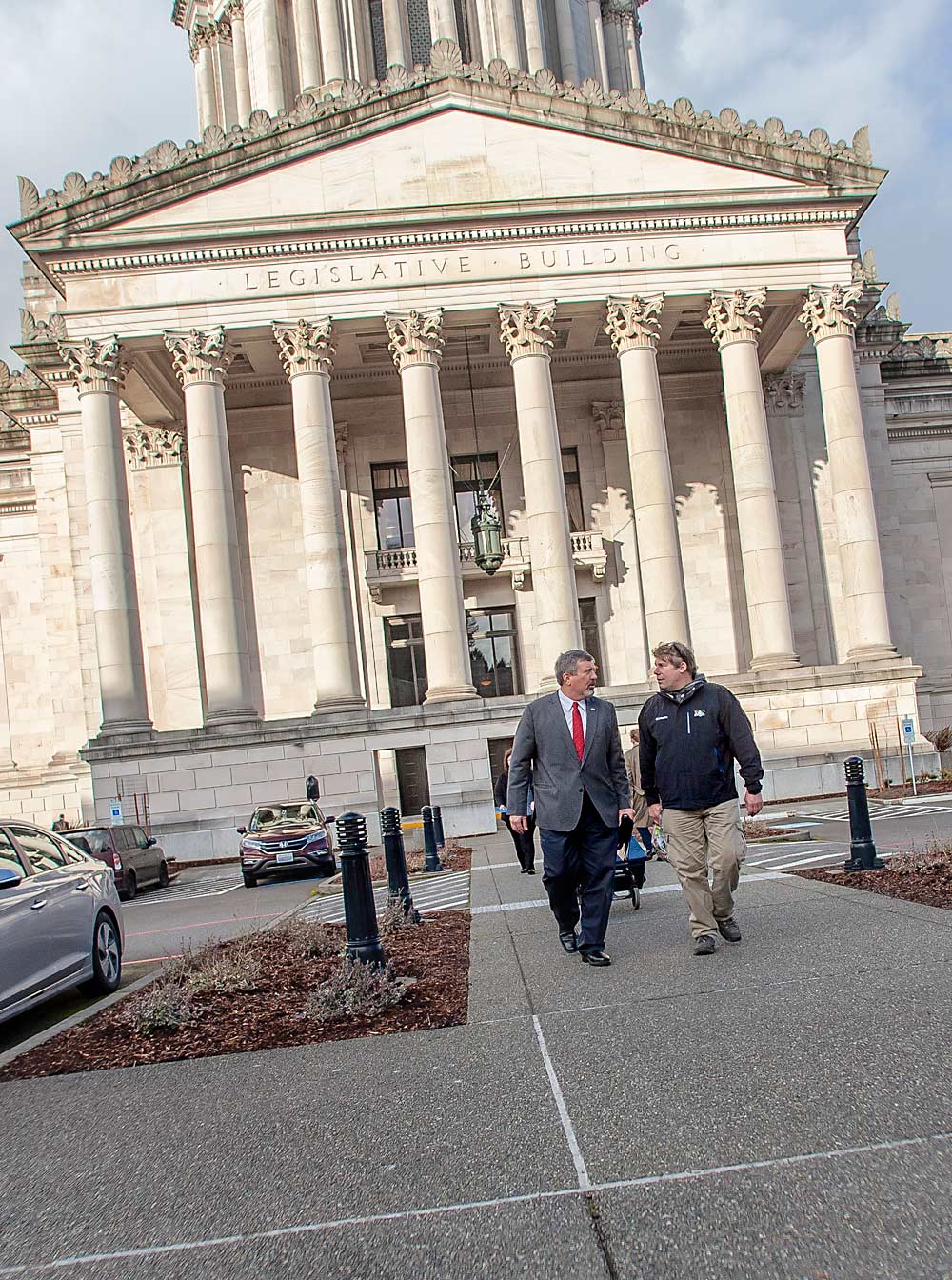—column by Jon DeVaney, Washington State Tree Fruit Association
—photo by Ross Courtney

Growers and farmworkers take pride in their resilience and ability to overcome a variety of challenges — from complex paperwork to catastrophic weather — to get the job done. This stubborn “rub dirt on it and keep going” approach has contributed greatly to the success of our industry over the years. However, every strength can be taken too far and eventually become a weakness. The detail-oriented boss can become a micromanager, and the thoughtful employee can suffer from analysis paralysis. In the same way, our own resilience can lead the public, government and our customers to assume that there are no limits to the burdens we can bear.
We are all too well aware that the challenging market conditions of the past couple of years became truly dire in 2023, as a compressed cherry season was followed by a near-record apple crop and correspondingly low prices. Growers who had weathered tough times before were forced to put their orchards up for sale, while others continue to struggle to fund ongoing operations with the hope that conditions will improve.
As ugly as these conditions have been, consider what is visible to an outside observer. Unlike other industries where a closed business means a vacant storefront, orchards may change hands without any obvious signs. Even when an orchard is removed and the land is put to other uses, this may be assumed to be a result of “cashing in” rather than a decision forced on the owner due to the absence of said cash. Moreover, a grower struggling with feelings about relinquishing a multigenerational family business may be unwilling to discuss their reasons for doing so, because this feels like a personal failure, not the consequence of the problems facing the entire industry.
This silence from individual growers, at scale, can lead to the perception — by the public, media and elected officials — that all is well with us. This can cause them to discount our collective calls for relief or, at the very least, a moratorium on harm. Instead, the broader community may incorrectly assume that our industry is capable of taking on an even heavier load.
For example, in November 2023, the Washington State Senate’s agriculture committee held a work session on the impacts of implementing overtime pay in agriculture. A spokesman for the union Familias Unidas por la Justicia testified that growers were enjoying “record profits,” even as it was clear that conditions had gone from bad to worse. While legislators questioned this claim, the statement itself (and the speaker’s expectation of being believed) is an indication of the consequences of suffering in silence.
The Washington State Tree Fruit Association and your other industry organizations are explaining the challenging circumstances facing growers by sharing statistical information about market losses, production and labor cost increases that far outpace grower returns, and also the resulting loss of producers. This economic data helps, but it is often far less memorable and persuasive than personal stories from the people who live and work with the impacts.
In January we will have a new president in Washington, D.C., a new governor in Olympia for the first time in 12 years, and many new members in Congress and the Legislature. In Washington alone, lawmakers will confront a projected $5 billion deficit — before even knowing the outcome of several initiatives that could reduce tax revenue. Legislators will be tempted to fill this gap between desired ends and available means by increasing taxes and fees on businesses and by shifting the government’s responsibility for meeting public goals onto private entities through regulatory mandates. It will be more critical than ever that we ensure these elected officials understand the consequences for our growers, their employees and their communities if they are pushed past the breaking point.
You can help by being prepared to testify, in Olympia or virtually, on issues that impact our industry. Invite your family, employees, suppliers and customers to do the same. Even if you do not testify, many legislative hearings offer an opportunity to register your support for or opposition to particular bills. Legislators do note the level of interest and/or concern about proposed laws, and it can reinforce our messaging about their impact.
We also need growers who are willing to talk to the media about our issues and their individual experiences. Many of us in agriculture like to complain about reporters’ ignorance of agricultural issues or the coverage we receive, but then many decline to talk to those same reporters. It is not necessary to talk to everyone about everything, but agreeing in advance to be a resource and to allow WSTFA to refer reporters to you (when appropriate) can lead to improved coverage of our industry’s perspectives and ultimately influence public opinion.
You can also stay informed by ensuring you are signed up for WSTFA’s electronic newsletter, Tree Fruit Topics. Growers whose fruit is packed by one of our packer members are already considered WSTFA members and can receive member benefits without paying additional dues. You can sign up at: wstfa.org/membership. We amplify key messages and favorable stories on our Facebook and Instagram channels, so please follow us and share these stories with your own networks.
We will be telling difficult truths to our legislators at our annual Tree Fruit Day in Olympia on Jan. 28, 2025. Participating industry volunteers will attend meetings with legislators in small groups, scheduled by WSTFA and led by experienced leaders. If you are uncomfortable sharing difficult circumstances in front of a large audience or on the record, this is an opportunity to share this impactful information directly with decision-makers. You can find more information and the registration form at: wstfa.org/tree-fruit-day.
It is common to complain about the public and elected officials being out of touch with the challenging realities of agriculture. Changing this reality requires a willingness to share some uncomfortable details about the difficulties we face. •






Leave A Comment